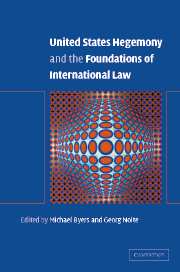Conclusion
Published online by Cambridge University Press: 13 July 2009
Summary
The question
Do not jump to conclusions! It is too early to tell! Such advice has been given to the editors of this book. It is good advice. Little more than a decade has passed since the end of the Cold War. It is only a few years since the perception of a predominant role on the part of the United States in international relations took hold. Although this perception has by now become conventional wisdom this does not necessarily imply that substantial changes to the international legal system have occurred, let alone changes to its foundational rules. We do hope, however, that this book demonstrates the legitimacy of the question posed. It may be too early to tell, but it is not too early to observe. Before drawing even tentative conclusions, however, it is necessary to address a few questions about the assumptions on which this project has been based.
The United States as the focus of inquiry
To ask about the effects of United States hegemony on the foundations of international law may appear somewhat old-fashioned. Vaughan Lowe and others ask whether it is appropriate in our time of “multilevel governance” and of influential domestic and international non-governmental organizations to focus on “the United States” as if it were a monolithic and unitary actor.
- Type
- Chapter
- Information
- United States Hegemony and the Foundations of International Law , pp. 491 - 514Publisher: Cambridge University PressPrint publication year: 2003
- 2
- Cited by

